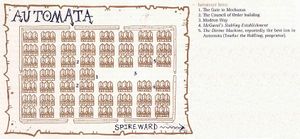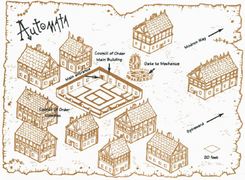Automata
| LN small city |
| Corruption +1; Crime +0; Economy +3; Law +0; Lore +1; Society +4 |
| Qualities academic, planned community, racially intolerant (any chaotic), strategic location |
| Danger +5 |
| Demographics |
| Location Outlands |
| Government council |
| Population 10,000 () |
| Notable NPCs Captain Arstimis, head of the town guard (Pl/♂ githzerai/fighter 14/Harmonium/LN) |
| Marketplace |
| Base Value 4,400 gp; Purchase Limit 25,000 gp; Spellcasting 7th |
| LN small city |
| Corruption +3; Crime +2; Economy +4; Law -5; Lore +4; Society +0 |
| Qualities notorious, prosperous, under-city, rumormongering citizens |
| Danger +35 |
| Demographics |
| Location Outlands |
| Government secret syndicate |
| Population 10,000 () |
| Notable NPCs Leggis Scrog, representative of lawbreakers and criminals (Pl/♂ githzerai/rogue 10/Revolutionary League/NE) |
| Marketplace |
| Base Value 6,400 gp; Purchase Limit 50,000 gp; Spellcasting 6th |
As the gate-town to Mechanus, Automata stands as a monument to order, both its positive and negative aspects. Described by many as the most ordered city in the Outlands, it's laid out along a perfect grid of 54-foot blocks between 6-foot streets broken only by Modron Way, the 60-foot-wide thoroughfare starting at the Gate to Mechanus and leading spireward towards the city's main entranceway. Even the days and nights here, affected by the proximity of Mechanus, are perfectly arranged, each lasting for precisely 12 hours before fading to the next.
Indeed, if one were to describe the city in a single phrase, "meaningless regularity" would be a perfect candidate. The urban planning of the city is an excellent example of exactly that. By law, the buildings of Automata are all built to be nearly identical, constructed of the same grey-red stone with no building allowed to reach above four stories. They're all near-identical in appearance, with the only usual variation being for plot size and with a scant few exceptions vary from one to another only where necessity requires it. Blocks are assigned a specific purpose, and no building may be used on a given block for a different purpose than such. However, blocks are not placed within the town in any sort of sensible arrangement. The local overlap of purpose combined with the general inconvenience thus tends to wreak havoc on the local economy, and despite repeated petitions to the city's government, the Council of Order, there has never been even the slightest movement towards change.
However, this is merely a single example of the ridiculous measures pursued in the name of union with Mechanus. Such foolish consistency marks the entire city, as high as the horrid bureaucracy of a government, and as low as the "uniform" willingly adopted by the numerous lawfully-inclined petitioners residing in Automata. All such efforts are directed at the singular goal of transitioning the city into Mechanus, but the sheer senselessness behind so much of it helps to ensure that it will never be accomplished, despite the best wishes of many of its citizens. Also contributing to the failure is the Council of Anarchy, a body mirroring the Council of Order that works to ensure its own existence by keeping Automata exactly where it is.
Government
The government of Automata consists of two branches, above and below. Above ground, the city is ruled by the Council of Order, a three-person body that ostensibly represents the needs of all the city's citizens. All three seats on the Council are elected positions, the first of which serves not only as a Council chair but also as captain of the town militia; at the moment, that position is occupied by Captain Arstimis, a humorless githzerai and member of the Harmonium. The second seat is filled by an elected representative of the city's craftsmen guilds, currently occupied by Pelnis the Clockmaker of the Clockwork Guild. The third represents the city's religious bodies, and is currently occupied by Serafil, a priestess of the god Lei Kung. These three bodies legally represent the whole of the city, and thus by city law any individual who does not fit in one of these three categories has no voice in the city government. Of course, the whole of the government cannot be run by merely three people; the rest of the governmental structure of the city is managed by the Fraternity of Order in service to the Council. Though they hold final say and can overrule any actions or decisions on the part of the Fraternity, they leave most matters to that faction, dealing only with issues they deem of sufficient importance to warrant their interference.
Below ground, the Council of Anarchy rules. Also an elected three-person body, this council controls all illegal actions and endeavors in Automata. (In fact, the Council of Anarchy is codified in the city laws as the organization responsible for such, in hopes that by restricting illegal activities through legal procedures these activities could be minimized. This effort has obviously not worked especially well.) However, controlling all criminal activity in the city is merely their secondary priority; the chief pursuit of the Council of Anarchy is to prevent the slide of Automata into Mechanus. Though contrary to their legal purpose, this concerns few. Each of the three seats represents a specific cross-section of the Underground, much as the Council of Order. The first seat represents all criminal organizations and individuals, and serves as well as the Guildmaster for the Thieves' and Assassins' Guild. At present, this seat is held by Leggis Scrog, a harsh man that constantly works to ensure no criminal activity goes on without his benefit. The second seat represents the vagrants, panhandlers, and dregs of society, and is currently held by Ravis Corcuncewl, a former spice merchant that fell on hard times some years ago and lost everything. The third seat represents invaders and those that work contrary to the city; though considered by most as the Fiend seat, given that nearly all such efforts are from one fiendish race or another, officially any outside forces working against Automata's interests are represented by this seat. This seat is presently held by Aurach the Fair, an erinyes working to subvert the city as only a baatezu could.
The Underground
The literal underbelly of Automata, the Underground is a system of tunnels beneath the city streets, spread out across the whole breadth of the city. It's here that the majority of illegal activities are pursued, and criminals of all stripes and varieties can be found here. From mere revelry to the worst of the criminal element, anything frowned upon in the light of day is located in some nook or cranny of the Underground. Those who for one reason or another wish to avoid the laws of Automata tend to congregate below as well; not an insignificant number, as the laws of Automata are so plentiful and mind-numbing that it's quite easy to break them wholly by accident. Though officially recognized and known of by the town guard and most of the citizenry, most actions in the Underground are ignored so long as they remain underground. Out of sight, out of mind is the belief of most of those within Automata, who think that keeping lawbreakers "out" of the city can only help encourage their slide into Mechanus. They couldn't be more wrong, of course, but unfortunately this is realized by few, and any efforts to abolish the Underground are strongly fought in order to keep the criminal element from operating "within" the city.
Gate to Mechanus
The Gate to Mechanus is a massive toothed gear laying on its side in the center of town just in front of the Council of Order's main offices. Rotating without any apparent motive force, this gate is closely connected to Mechanus, more so than many gate-towns' portals. As a result of this, unlike many such portals, the Gate to Mechanus can connect to a variety of locations within that plane. The location to which it sends a person that uses it varies based on time of day, and the rotation of the gear mimics in some way the spot to which it is currently connected. Unfortunately, the correspondence is a complicated mathematical equivalence of some sort, understood only by the most learned. Thus for the safety and convenience of travelers (or so they say), the Council of Order has instituted an elaborate system of forms and permits to be followed, to ensure that those that wish to use the portal arrive exactly where they need to go. During the day, the portal is heavily guarded, with only those with the proper papers allowed to pass. At night, when the people of Automata are legally obligated to sleep, the sparser guard means there is a fairly heavy traffic amongst those wishing to avoid the reams of paperwork for one reason or another.
Sites
Above Ground
- The Divine Machine
- Gate to Mechanus
- McGuvol's Stabling Establishment
- Mona's Provisions
- Thandol's Smoked Meats
Underground
- Hokee's Shop
Residents
Above Ground
- Captain Arstimis (Pl/♂ githzerai/fighter 14/Harmonium/LN)
- Kimura Hoshi (Pl/♀ half-elf/cleric 5 (Kagutsuchi)/CN)
- Heiron Lifegiver (Pl/♂ half-elf/wizard 14/N)
- Loctus (Pe/♂ human/bard 3/LN)
- Mona (Pr/♀ halfling/expert 4/CN)
- Muenscaal (Pl/♀ tiefling/fighter 3/Free League/N)
- Pelnis the Clockmaker (Pe/♂ human/expert 13/N)
- Serafil (Pl/♀ tiefling/cleric 10 (Lei Kung)/Fraternity of Order/LN)
- Thandol (Pe/♂ human/commoner 1/LN)
- Tourlac (Pe/♂ halfling/expert 6/N)
Underground
- Aurach the Fair (Pl/♀ baatezu (erinyes)/LE)
- Ravis Corcuncewl (Pe/♀ human/aristocrat 6/N)
- Filatiere (Pl/∅ unknown/??)
- Geartooth (Pl/∅ rogue modron/expert 12/CN)
- Jezrene the Quickeye (Pr/♀ elf/wizard 6/rogue 7/NE)
- Amber Redclaw (Pl/♀ tiefling/expert 8/Doomguard/LE)
- Sentar Redclaw (Pl/♂ tiefling/expert 7/LN)
- Leggis Scrog (Pl/♂ githzerai/rogue 10/Revolutionary League/NE)
- Beryl Stormcloud (Pr/♀ half-blue dragon/expert 3/LE)
- Delgen Stronghelm (Pl/♂ dwarf/expert 14/N)
Gallery
| Images of Automata | |||||||||
| |||||||||
Reference
- The Great Modron March, pgs.14-15,17-21
- A Player's Primer to the Outlands, pp.8-9
- Planes of Law - Mechanus, pg.4
- Planescape Campaign Setting - Sigil and Beyond, pp.28-29

